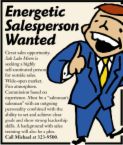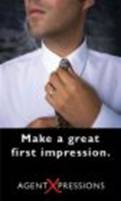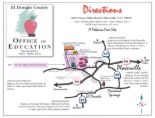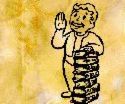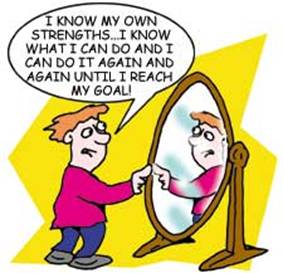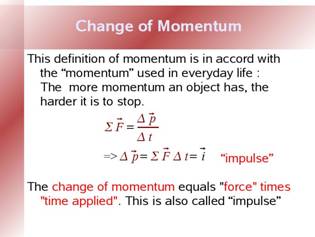|
|
|
Congratulations you have been chosen for an in person interview with one of MTA's clients, you have accomplished
a lot! This interview maybe your first interview
with the client or it may have been scheduled after a successful phone
interview. MTA's clients are some of the top Fortune 500 firms in the financial
services industry. By making it through our prescreening processes as well as
our client's it says a lot about your ability and experience. We both like
your story. Now you need to make your story come alive and convince the
client that it was not fiction, but your real live story. Remember for this moment you are a sales
person selling the best product - You! At this point you are going for an in person
interview with a client who could make you an offer after the interview or
may ask you to return for additional rounds of interviews. Either way
your resume or phone interview story must now come to life. The story
they have read on your resume now must be substantiated and it must
accurately reflect you and your experience so they
are confident that you are the type of person that they want to have working
with them. This is your last opportunity to make a first in person
impression with this client! Make the most of it! Anticipating and attending an interview can be very stressful; after all it is an event that can have a huge impact on your life. Changing jobs ranks high on the stress meter. By being prepared you can minimize the stress and control the situation. Here are some tips to help you prepare for the in person interview and manage the stress that may arise during the actual meeting. Many of these points are practical or common sense, others may not be as obviously apparent. 1. · Plan out your attire a few days before, making sure that your favorite suit is not sitting at the dry cleaner or worse, in your hamper! 2. · Formal Business Attire is always best for an interview! Making a professional impression can never be wrong
· Plan adequate time to get ready for the interview to ensure
that you don't f · Plan to arrive at the interview 15-30 minutes early to have a chance to collect your thoughts. · A staff member from MTA will meet you at the interview location at this time to greet you and provide you with any last minute details. · If you will be leaving your current job and going straight to the interview, make sure you have carefully planned out where you will change your clothes, wash-up, brush your teeth and make sure that you have factored in enough time to refresh yourself · Eat right the day before and the day of your interview - nervousness can affect your appetite, but it is important to eat healthy and have some energy on the day of the interview - neglecting to eat or eating the wrong things, can make you lethargic and cause you to be uncomfortable during the appointment · Ask your MTA contact if there is anything special you should bring
with you or prepare for, this will help to prevent you from being caught
without something you could have easily prepared. · Organize what you are taking with you the day before and put the items together in your brief case! · Make sure to have the job description, a list of any questions you have and the directions to the interview location, accompanied with contact information in case you have any last minute trouble with directions or are running late. ·
Your MTA contact (we try to meet everyone; if we are not going to
be meeting you for any reason we will let you know in advance) will provide
you with copies of your resume, as well as copy of the requirement to take
into the appointment so you have a resume to present and refer to during the
appointment.
· Allow plenty of extra time to get to the interview! If it is a trip that takes 1 hour, leave yourself 2 hours or close to double the travel time. There is nothing more stressful then encountering road construction, a detour, a traffic accident etc., when you are traveling in unknown territory and are concerned about time! Remember, if you are early, you can take time to review your information or read the newspaper to kill time! · Bring a Photo-ID with you! Most companies have stringent security measures in place and many will require ID to sign into the building as a Guest for an interview. · Make sure you have cash with you! Whether it's needed for a last minute bottle of water, an unexpected toll or parking fee, it is always a good idea to have cash with you for any surprises along the way! · Once you arrive, remember your interview begins the minute you arrive at the location you never know who you may be speaking with! Represent yourself with professionalism to every person you speak with and encounter! · Once you arrive at the location and
meet the MTA representative
(once again, we try to meet everyone, if we are not going to be meeting you
for any reason we will let you know in advance) turn off your cell phone! · Take a deep breath and try to relax! You want to go into the interview calm and confident � taking a minute to calm your nerves and refreshing in the restroom can be a great way to feel confident and ready to begin. If you have had any trouble getting to the interview, be sure to take a few minutes to calm yourself before entering, you don't want to arrive frazzled or talking about the terrible trip you have had! · It is very important to meet with your MTA contact prior to checking in for the interview, as there
are routinely last minute changes regarding the
interview process and we will also be able to provide details on the client,
the hiring managers, and the project
· Once you are with the Manager, remember to smile and be upbeat! Smiling is contagious! 2. · Try to establish a common interest with the Manager, if you see a picture in his office of a sports team or recreational activity, make a comment. Establishing a common interest will help to generate conversation which can be a great relaxation technique. Often if a common interest is established it can change the entire mood of the appointment! Plus the Manager will get a sense that you are interested in him and then ultimately interested in joining his team! 3. · Politely verify with the Manager the description of the position you are interviewing for, making sure that he will be talking to you about what you are prepared for. There is nothing more stressful than to be into the interview and find out that it is not the position you thought, this will cause you to stumble and possibly fail the interview. 4. · During the question and answer session, visualize yourself doing well! Feeling confident in your responses will show to the Manager. 5. · Answer questions completely! Avoid Yes / No answers and support all of your answers with details of past experience, knowledge, education etc. By expanding on the interviewers question with a detailed answer, you will help control the direction the interview goes. If you answer with one word, you force the manager to keep questioning, where as, if you offer explanation and details, the Manager may direct his questioning to the information you have offered. If you are talking about the details you are offering, you will be more comfortable and more successful. 6. · Posture is very important, sit up straight and keep your hands and legs relaxed to avoid nervous activity! Breathe slowly and deeply throughout the interview. 7. · Speak slowly and clearly when answering the questions and pause continuously so you don't become choked up on your words. 8. · Don't hesitate to refer to your resume for dates and details of your position. Often a statement on your resume will help you to organize your response to a question and help you to present your experience in an orderly and coherent fashion instead of rambling, "Oh, and I did this, and then I did that, oh and once I worked on that. 9. · If you lose your thought, pause and re-group your thoughts and then continue with your answer. It is better to take a moment to pause then to continue rambling on without a solid direction. 10. · If a question is difficult, pause to think through an organized response. If you don't know the answer, indicate that to the Manager but offer any relevant information along with your response. Don't make up any information or 'fib' about any experience you don't have. Remember, this may not be the last question on this subject matter and if you exaggerate your experience or knowledge it may cause the questioning to continue and it become evident that you have no idea what you are talking about. 11. · Don't panic over questions you are unable to answer, rather focus on the questions you are answering well and keep your confidence level high! · Being honest in your interview will keep it stress-free! If you wander off from the truth you will feel uncomfortable and overwhelmed and this will be obvious to the Manager! 13. · Keep yourself focused during the interview, listen carefully, ask for clarification if you don't understand and keep your thoughts organized at all times. 14. · Feel free to ask questions, in fact, the most successful interviews are those that are actively contributed to from both sides. Asking questions will establish conversation and help you to relax and give you the opportunity to fully understand the position. 15. · Don't hesitate to take the 10 second pause at anytime! A 10 second pause will not be noticed by the interviewer and can help you to, catch your breath, and think through your next response. 16.
Interviewing and the stories we tell: 17. An interview is a conversation and, like any good conversation, a candidate can make an impression on the interviewer through the stories he shares about himself and his past projects. Below are several items to remember regarding personal stories, anecdotes and their use in interviews: 18. · For each of your primary skills, you should have a story; this includes both personal skills (such as your leadership or analytical skills) and technical skills (C++, Java, or UML) 19. · They need to be about you, not a mentor or a colleague; they must be about your goals, your skills, your struggles, your achievements, and tell not only how you did something but why you did it. 20. · Just as you review and brush up on various systems and technologies before an interview, you need to prepare and have your stories ready to go before an interview. 21. · Keep the stories simple; they should last between 30 and 90 seconds; Rehearse them with someone, ensuring that they are on point and focused. 22. · Your stories must include not only how you did something but why you did it 23. · They need to focus on your core skills and expertise, and should affirm what you will bring to the position. 24. · Stories need to illustrate your value to the firm, for example you can share that your ability as a leader led to the successful completion of a project ahead of schedule, or that your analysis led to increased functionality of a system. 25. · Be selective with your stories; consider them fully - a story that illustrates your competitive drive if not done right might lead the interviewer to the conclusion that you do not work well with others. 26. · Stories must be honest and sincere; they cannot evolve as you tell them, which comes from not only truthfulness but also preparation. 27. Interviewing is a unique experience! 29. Unlike how most of us choose to live our lives, during an interview we cannot let our accomplishments speak for us. You need tell people during an interview what you have accomplished and what you will accomplish for them! 30. · Brag about your achievements, your challenges and goals, now is not the time to be modest, take credit for what you have done on past projects and show the interviewer what you are capable of. 31. · Be able to explain not only how, but why you used that technology; for example- On my most recent assignment we chose to use Java because it runs on all platforms only
one chance to make the impression; do not guess about the skills, stay
focused on the things you know best 33. · Review skills, especially if it is one you have not used in your current project and be able to cite technology and reference example of where, how, and why you used it 34. · Remember that communication is bi-directional, not only should you provide information but they can also provide information to you 35. · Do not hesitate to ask the interviewer to repeat a question; as opposed to guessing at what he or she said 36. · Be prepared to talk about your recent projects, complete with examples of what you did, how you did it and why, and likewise be prepared for follow up questions probing those technologies and your depth of knowledge 37. · When the question is about what you did in a particular project, you need to provide not only how you did it but why you did it; for example: I was working for company XYZ on was working in their system group supporting a Derivative system, the client needed to add functionality to the system because of recent governmental regulation changes, the system was written in Java I was responsible for making those changes, and that technology was used because. . . 38. · When an interviewer asks you why they should hire you, you must speak confidently and honestly about your abilities, which is achieved by knowing your goals, your skills and your achievements. It is important to acknowledge your abilities and accomplishments such as having a very strong work ethic, integrity, excellent industry experience, and that you can aggressively pursue your goals 39. · Highlight and elaborate on your strongest skills, both technical and personal, especially the ones required by this project 40. · If you have not worked with a specific technology or business area, keep your answers short and concise and try talking about the skills that you are more confident about 41. · Remember that most interviewers will tend to ask follow up questions on what you are talking about. Remember to try to get the conversation back to your strengths. Avoid lengthy discussion on things you are not comfortable with 42. Here are some common interview questions; be prepared for them! 43. Take the time to formulate answers to each question, focusing on specific tasks and accomplishments. 44. · Why did you leave your last job? Interviewers will always want to know your reasoning behind leaving a company especially after working for only a few months. Tell the truth, without speaking negatively about past employment. 45. · Why do you want to work here? Always answer truthfully. If you know someone who works/has worked there and has had a good experience, say so. Knowing the companies products or services that you can relate to, and discussing them in a positive way is a very good answer. Location of where you'll be working can be an important factor if the commute is reasonable. 46. · What are your strengths and weaknesses? This is one of the most well-known interview questions, and interviewers often asked indirectly, as in, "What did your last boss suggest as areas for your improvement during your last review?" Answer in a way that your strengths" will benefit the prospective employer. Although you may be a great cook, it might be of little value for the job at hand. 47. · What is your most significant accomplishment? Try to quantify your contributions in your past performances. You may have developed or improved a program that enabled the application to run in less time, saving considerable money. Accomplishments should be quantified as best you can to show your ability to do the same as a future employee. 48. · Can you give an example of how you have handled a mistake? Everyone has made a mistake in on a job. Don't say you never have made a mistake. That would imply that you haven't done anything. Focus on one or two events, emphasizing the resolution you implemented to correct the problem, and how well everything worked out. 49. · What is your ideal work environment? This question is geared toward your productivity, not your comfort level. Don't say you work best in a private office. You may emphasize that an environment where you can get and share information easily that will help you and other employees accomplish tasks in an efficient and friendly cooperative way would be an ideal work environment. 50. How do you handle the unexpected and unwanted interview events? 51. Late for the Interview! A traffic delay caused by an accident, a funeral procession, mechanical failure, your bus, train was very late (or went in the wrong direction)�you're going to be late for your interview! Try to relax and get your thoughts together. You have to make a very important call to the company's interviewer. As calmly as you can, apologize for the delay (even though it's not your fault), and give him a realistic estimate of how soon you can be there. Chances are that the interviewer will understand and allow the delayed interview to take place or reschedule it, if you handle it properly. 52. You are asked a question which you don't know how to answer! Stall a bit, and ask the interviewer to clarify the question or a portion of it if it is a complex question. Don't try to be witty, but give him credit for a good question. This will probably get the interviewer to clarify his question to the point where the answer is obvious, in fact, he may answer the question himself for which you can readily agree with his answer as if that was exactly what you were thinking! 53. You do not have a copy of the MTA resume prepared for you! This will put you at a disadvantage since you can't see which item the interviewer is referencing on your resume, but it can be overcome because you have a very good image of the resume you prepared and sent to the interviewer. If you realize that you forgot copies of your MTA prepared resume before you are asked for it, let the interviewer know, apologize, and have a reasonable excuse ready. The interviewer will probably have a copy of your resume on hand. Turning the tables on a bad interviewer 2. Just because someone is interviewing you, doesn't mean they're a good interviewer. Don't let his ignorance sabotage your interview or your chances at landing the position. 3. You are well prepared for the interview. You are wearing your best business attire, a suit with nicely polished shoes, and you have 'boned up' as best you could on the technical topics and personality characteristics that may be discussed. What you have not prepared for is 'stone silence' or 'negative feelings' from the interviewer. 4. · Break the silence, or get away from negative feelings, before he completes his presentation (or lack of) by politely interrupting and asking your interviewer to describe the assignment that you are applying for in as much detail as he can. What is a typical day like? What would your key responsibilities be? What are the normal hours of a work day? Will there be a need for off-hours (evenings and weekends) work? Is there any travel involved? How many leaders and co-workers will there be on your project? What is the project deadline, if known? What is he looking for in the ideal candidate for this assignment? A poor interviewer will likely omit asking you many of the "right" questions, particularly those about how your experience makes you a great fit for the position. 5. · Don't be shy when talking about your experiences and accomplishments. The 'negative' interviewer may never ask you what you have done in prior assignments. Let him know in a direct and concise way why you took certain paths and what you accomplished in past projects. Make eye contact with him at all times and do not ramble. In your presentation, try to show the similarities between the positions you are applying for and the projects you worked on in the past. Get the interviewer to talk about himself. 6. · Try to make a personal connection with the business career, hobbies, sports and/or family life of the interviewer. Ask him questions about how he came to work at this company, what drew him to this position at this company. See if there are any sports he likes to play or observe. If any, what are his favorite teams? If he has a family, get him to talk a bit about his children. If the interview is being conducted in his office, he will most likely have pictures of his family. Most parents love to talk about their children's achievements. Show interest and enthusiasm in his answers, even if they are boring! Last, but not least, ask for a tour of his facility 7. · If time allows, ask for a tour of his department. As you walk around, try to get your interviewer to introduce you to other people who work there. If the opportunity arises, get the interviewer to introduce you to the team you would work with if hired. Good time now to offer up some complements about his organization and how well it's run. A
After the interview please contact your MTA recruiter ASAP with your thoughts and
feedback on the interview. It is best if we hear from you before we
hear from the client. 9. Good luck, remember to follow these tips. Remember that the client is just as hopeful as that your interview works out favorably. Be confident! 10. Remember for this moment you are a sales person selling the best product - You! |
|
ABOUT OUR SITE Our web site provides a full description of our quality services, links to employment opportunities, information regarding employment through MTA, and special content reserved for our sub-contracted professionals. We encourage feedback from our readership to further assist in the continued improvement of this site and our services. |
|
|
|
© Copyright 2017 Merritt Technical Associates, Inc. All Rights Reserved. |



